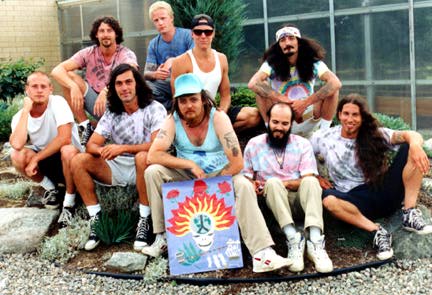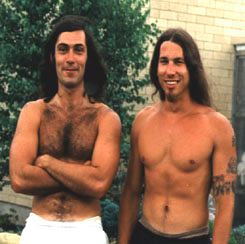Deadheads Behind
Bars
Poem 1 / Poem
2 / Operation Dead End
The Grateful Dead was a band that played psychedelic music together since the days when LSD was legal and was sold on large sugar cubes. For some fans, "acid" has been part of their passage into an inner realm of Deadheads; those who share a unique experience in an atmosphere of intimate trust.

Photo: Deadheads at FCI (Federal Correctional Institute) Raybrook NY.
This reputation, plus its casual acceptance of odd behavior in an atmosphere of funky marketplace, makes this group an easy target for sting and entrapment operations. Due to the bulky carrier materials used, such as thick blotter, LSD cases routinely serve mandatory minimum sentences based on many times more paper than actual drug. There are about 2000 Deadheads in federal prison for LSD or marijuana cases, serving anywhere from Five Years to Life.
In 1990 the Drug Enforcement Administration (DEA) opened a San Francisco office for its recently formed LSD Task Force. In some cases, agents spent years establishing trust with young people in "Deadland" in order to entrap them into drug deals. Christian Martensen's case is but one of many. The taxpayers foot the bill for the LSD Task Force, plus an estimated $40 to $50 million yearly to incarcerate these 2,000 prisoners.
The culture surrounding LSD use does not involve other criminal or violent activity. With few exceptions, they are non-violent, peace-loving, and the vast majority are serving these long sentences for a first offense. Despite the adversity, many Deadheads maintain a positive attitude and even develop a sense of community in prison, expressing themselves through their artistic activities and communicating through the pages of their own publications.
It is widely believed that Deadheads were targeted by the DEA beginning in the late 1980s as "Operation Dead End," and undercover agents were disbursed in large numbers to infiltrate the community. Although the Department of Justice denies the existence of such an operation, there is a clear pattern of Deadheads being prosecuted / persecuted because of their lifestyle choices. The defendant's "alternative lifestyle" is often presented during trial as evidence for conviction or for sentence enhancement.

Aaron Taylor and Todd Davidson
Deadheads Behind
Bars
- By Chuck Dean
Dealt a little LSD
Ended up in jail
And I didn't hurt a soul
Don't want to be in this Hell
Here I sit
Even now I cry
All I
Do is wonder why
Someone put me hereBecause I thought
Enemies were my friends
Here they put me
In a world where happiness ends
Not knowing love, or peace of mind
Don't even let me smoke The KindBut all I do is hope
And pray
Remembering that
Someday this will all go away.
Destination Unknown
Destination Unknown
- By Aaron Davis
I stand and listen to the wind
sigh through the trees
bare with season's changeI feel how lonely she must be
forever roaming
destination unknown.I reach out to her -
"come, let us be a comfort
to one another."She caresses my arm
plays through my hair
and whispers softly in my earThen she is gone
and I am left in stillness
with memories of a passing friend.
 HOME
HOME